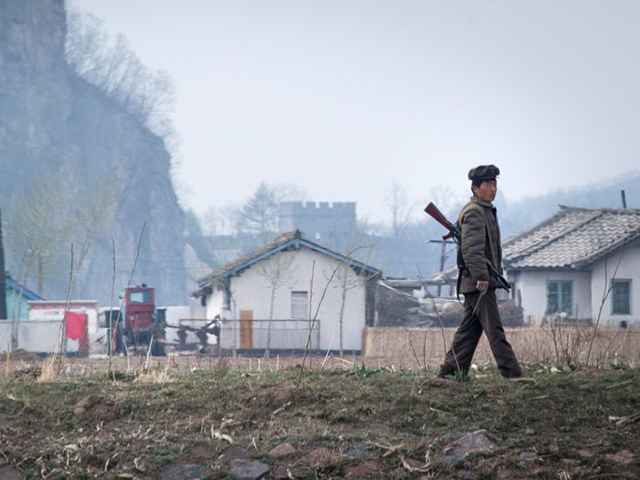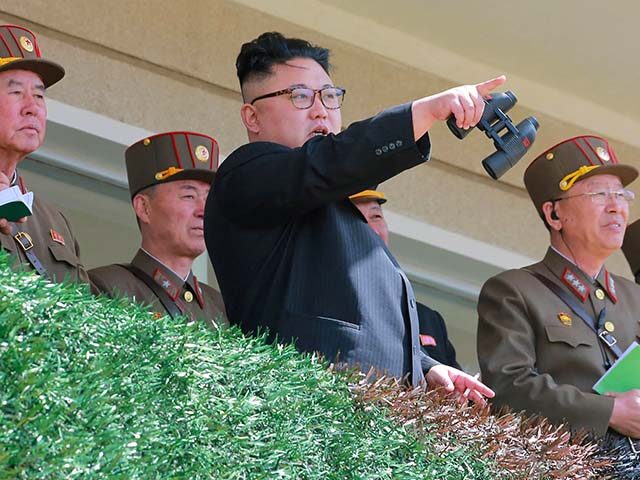A South Korean government-linked think tank accused the communist regime of North Korea in a report published Wednesday of staging public executions of people accused of violating the nation’s strict Wuhan coronavirus protocols.
North Korea imposed arguably the world’s most severe coronavirus lockdowns in 2020 following the outbreak of a novel coronavirus infection in central Wuhan, China. Communist dictator Kim Jong-un locked down the country’s porous border with China – reportedly devastating food and other critical supplies – and implemented “shoot-to-kill” orders to soldiers on the border if they discovered any would-be crossers. The regime is also believed to have imposed strict sanitary mask requirements and limitations on social gatherings, as well as quarantine protocol for those suspected of carrying the disease.

A North Korean soldier walks near the Yalu river near Sinuiju, opposite the Chinese border city of Dandong, on April 16, 2017. (JOHANNES EISELE/AFP via Getty Images)
The Korean Institution for National Unification (KINU), a research center and think tank backed by the South Korean government, cited a refugee from the country who testified to the existence of public executions for coronavirus protocol violators. The revelations appeared in its annual human rights white paper on North Korea for 2023, published on Wednesday.
“North Korean authorities gathered residents together and publicly executed those who violated quarantine measures,” the unnamed defector reportedly said, according to a translation of the KINU human rights paper by the regional news site NK News. The outlet noted that the human rights report was the first to document executions tied to coronavirus lockdown and quarantine measures, though the website had uncovered “a notice threatening the death penalty for illegal medicine sales following the country’s first outbreak of [Wuhan coronavirus] in May 2022.”
The South Korean newswire service Yonhap noted that the KINU white paper did not offer any details on when the execution occurred, who was targeted, why they were executed, or the method of execution. It also did not explain how the regime justified a public gathering for an execution if it occurred during a lockdown. The lack of detail is not uncommon in North Korea reports, however, as researchers do not want to give the regime enough information to identify the defector and potentially imprison his or her family in a labor camp or execute them.
“The white paper, which also interviewed 70 other defectors who came to South Korea between 2018 and 2023, said it has obtained testimonies signaling a possible decline in public executions,” Yonhap added, “but it is too early to conclude whether public executions have actually become less common or whether they are being carried out away from the eyes of the public.”
Elsewhere in the white paper, the KINU documented evidence that the secretive North Korean regime had added “special laws on antivirus measures” to its penal code that would allow for executions of those convicted of violating them. The regime also reportedly expanded access to the death penalty for crimes related to “access of outside information”; North Korea strictly outlaws the consumption of media not created by the North Korean communist regime.
North Korea’s repressive coronavirus lockdown measures began in early 2020 and appear to have only been rescinded in July 2023, when regime media outlets began publishing photos of people not wearing sanitary masks for the first time since the pandemic began. The Kim regime spent much of the first two years denying that it had documented a single case of coronavirus infection, a claim that most experts on the regime deemed highly unlikely, given North Korea’s friendly ties with China and the usual bustle of illicit commerce on their mutual border along the Yalu River.
Kim Jong-un personally added to the suspicions that the Wuhan coronavirus was devastating North Korea’s dilapidated communist healthcare system by effusively apologizing and sobbing during a speech in October 2020.
“Although I am entrusted with the important responsibility to lead this country upholding the cause of the great Comrades Kim Il Sung and Kim Jong Il thanks to the trust of all the people, my efforts and sincerity have not been sufficient enough to rid our people of the difficulties in their life,” Kim said, according to state media. “I solemnly swear once again in this place that I will live up to the people’s trust without fail even if my body is torn and crushed to pieces on the way of defending their great trust and that I will remain faithful to that trust.”
Kim never explained what he was apologizing for.
General Robert B. Abrams, commander of U.S. Forces Korea (USFK), said in an interview in September 2020 that much of the commerce along the Chinese–North Korean border came to an abrupt halt as Kim Jong-un ordered soldiers to kill anyone attempting to cross the border.
“They’ve got North Korean SOF [special operation forces] manning these things, strike forces, they’ve got shoot-to-kill orders in place, and this is fundamentally about preventing COVID from getting into North Korea,” Abrams said.
Pyongyang finally admitted to documenting a Wuhan coronavirus case within its borders in May 2022. Within days, North Korean media claimed that over 1.2 million people had been diagnosed with coronavirus infections between “late April” and mid-May 2022.
In August 2022, Kim Jong-un declared a “shining victory” against coronavirus but did not end lockdown protocols for another year.

COMMENTS
Please let us know if you're having issues with commenting.